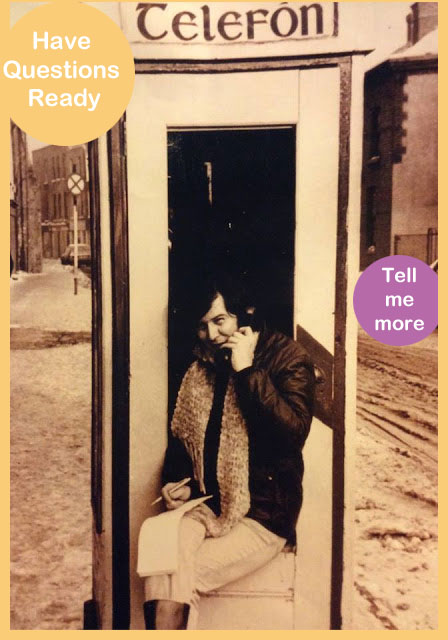Do the interview
Oral history interviews involve complex social interactions and there is no strict formula that should be followed to guarantee success. Respect, understanding and flexibility will be personal qualities that will influence the process but the art of interviewing is a skill that will be learnt and improved with practice.
There might well be merit in a lesson or two being devoted to practice interviews, where students interview each other or their teacher and get used to using different types of questions and prompts.
Capturing the Stories
Preparation & Practice makes Perfect
Recording Equipment - test and know how to use beforehand
- Whether it is a mobile phone, tablet device, video camera or a dedicated audio recording tool the interviewer needs to know how to work the equipment.
- Practice is important and students should practise on each other before doing a formal interview.
- If students are doing group work then one of the students could have prime responsibility for the actual recording.
- Schools have been using video and audio effectively for years and the capture and editing of material is getting easier with advances in mobile devices and editing software.
- On the day- be prepared to set up for the interview some time in advance. If recording, then ensure equipment is set up and working half an hour ahead of the interview.
Location is important
Arrange a suitable room so that the interviewee is comfortable and outside noises and interruptions are minimised.
Before the Interview
A preliminary meeting ahead of the formal interview is important, if it is being recorded, to explain the purpose and the questions as well as discussing copyright and the possibility that the interviews might be edited. Teachers need to decide their role in this process.
During the Interview
- When asking the questions – be prepared for periods of silence and avoid interrupting the interviewee.
- Expect digressions and remember that very often the best parts of an interview come about this way.
- Be prepared to encounter problems with accuracy about facts and consistency in the interview. This is normal.
- When dealing with human memory there will inevitably be shortcomings and the subject may also be biased.
- When interviewing, it is useful to encourage students to ask how people felt when things happened, expanding narrative beyond the known facts. These questions are useful in developing their historical empathy, as well as their factual knowledge
- This is where the ‘skill of the historian’ becomes important as they distinguish between fact and what is less accurate.
After the Interview
- Always thank the interviewee for sharing his / her experiences.
- Make sure permission forms are signed
- Send a written thank-you note.
- Let the person know when their story is live on Threads
- Reflect on how the questions went, discuss with other team members, and adjust for other interviews if necessary

Further Reading
Oral History Network Ireland
The Oral History Network Irelandhas good advice on conducting the interview
BBC Wales
BBC Wales has some great resources related to recording oral history.
Advice from Folklore Experts
The advice below specifically addresses collecting oral accounts
This may be too advanced for younger students and may need to be interpreted and simplified. It is taken from A Handbook of Irish Folklore which was first published in 1942. Some of the points refer to written, rather than recorded accounts, and with the advances in technology, may be no longer relevant, but the essence can be applied to modern forms of capture.
- Use your intelligence and initiative when collecting, follow every clue
- Even very small or seemingly trivial items of information should be recorded
- Items which are commonplace in a district should be recorded as well as the more unusual ones. What is commonplace in one district may be unique or altogether unkown in another.
- Record all kinds of information, even that which you have already recorded in other districts or from other informants. The more variants of an item recorded the better; what one variant lacks another may supply.
- Negative answers to questions should be written down as well as positive ones.
- Write down the information in the exact words of the speaker, if possible. Make "no corrections" or changes.
- If the informant spoke Irish, record the information in that language. Write it down in English, if it was given in English.
- Write as neatly and legibly as possible, all manuscripts are preserved.
- Leave a margin about half an inch wide vacant at the proper side, so that when the manuscript is bound, no portion of writing is hidden from view.
- The collector should state clearly (either on a slip affixed at the head of each item, or else as a note at the end) the name, age, and full address of the person from whom he recorded the information. It is most important that the source for each piece of information be given correctly.
- The collector should also give any information he has which may help to throw additional light on what he has recorded. For example, if only families which are known to have settled in a district in comparatively recent times pratcice a particular custom, that fact should be stated.
- In decsribing an unusual implement, vessel, house, bogfind, etc., a well-drawn sketch with measurements, or a photograph would add greatly to the value of the account. Similarly, a map showing the position oif a particular house, holy well, field-monument, or other object mentioned in the course of an account should, if possible, be given.
- If a custom or belief mentioned in a collection is no longer observed, the fact should be stated. The approximate date of the decay of a custom or belief should, if possible, be given.

